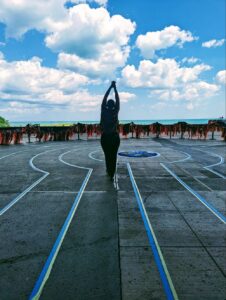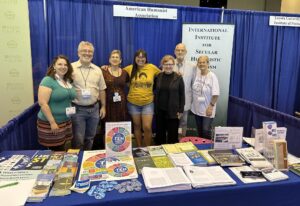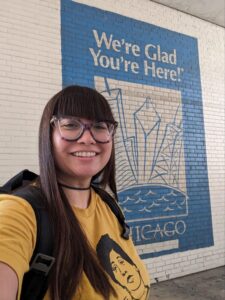Humanists Joined Parliament of the World’s Religions’ Call to Conscience
 A Parliament attendee at walks the labyrinth (photo by Vanessa Gomez Brake)
A Parliament attendee at walks the labyrinth (photo by Vanessa Gomez Brake) The 2023 Parliament of the World’s Religions theme was A Call to Conscience: Defending Freedom & Human Rights. Held August 14-18th in Chicago—where Parliament started in 1893 and returned for their next conference in 1993—it brought together over 7,000 attendees from over ninety-five countries representing over 210 traditions. Although the offerings of speeches, sessions, exhibits, performances, and stories can feel overwhelming, it’s also reassuring to be among people with shared values in humanity and a dedication to addressing human rights and climate change. Even those with strong religious beliefs recognized past and present religious harm and the need to end future harm by protecting the worth and dignity of all.

The AHA booth at the Parliament of World Religions
For Parliaments held in the Americas and online, American Humanist Association (AHA) ensures humanists are included by sponsoring a booth, participating in workshops, and connecting with attendees. This year we were also provided a free booth in the children’s section so we had more opportunities to share the Ten Commitments and answer questions about humanism. Before I was able to set up our children’s booth (halted by the opening processional of bagpipes, Chinese dragon dancers, dignitaries, etc.), an attendee came over to thank me for being here as he was hoping to see other atheists and humanists present. We received similar appreciations throughout the week from attendees who are humanists (especially those who also identify as Jewish, Pagans, Sikhs, and Unitarian Universalists), are friends with humanists (several pastors and rabbis noted they have atheist congregants), or just learned about humanism and were excited to learn more (enjoying our Humanist Common Ground series and materials from Humanistic Judaism and Ethical Culture).
Of course, we also had challengers. One man wearing a yarmulke asserted “there can be no Judaism without god” and didn’t care that Humanistic Judaism focuses on maintaining cultural and celebratory Jewish traditions without requiring a belief in a deity. Knowing it’s not our goal to convert anyone, our volunteer politely ended the discussion with, “Can we agree that we human beings should behave ethically toward one another?” and gestured towards our “I believe in good” stickers. After the man left, another volunteer noted that, “When the Nazis come to the door, they won’t ask whether you believe in God.” He referred to the Nuremberg Laws and its mention of Mischlinge (“mixed-race persons”) but no mention of belief. “Atheistic Jews, agnostic Jews and Orthodox Jews went to the camps together and all met the same fate.”
Performances and presentations took place in the main theater, through exhibit halls, and on the convention patio. For silent contemplation away from activities, there was a big, detailed labyrinth on the lower level and a smaller one upstairs surrounded by over 30,000 orange ribbons symbolizing the children who lost their lives to gun violence since the Sandy Hook shooting. On Thursday, August 17th, the small labyrinth held a demonstration by blacksmiths from RAWtools on how they transform weapons into garden tools. As their website explains it: “Beating swords into plowshares, spears into pruning hooks, and guns into garden tools creates a dynamic shift in our investment in time and resources.” Presenter Shane Claiborne emphasized that half of us have lost someone we love to guns and we can’t hide behind prayer to make the violence stop, it takes policies and people. While Majeste Pearson sang an original piece, attendees were guided in hammering guns and invited to share their stories. Gardening tools and seeds were available to take home. And that evening there was a Japanese ritual called Toro Nagashi where people placed lanterns on the water to honor those who have died and to help them find their way to the next stop on their journey.
“I was impressed by how many of the programs dealt with issues requiring concerted effort: gun deaths, climate threats, bioethics, sexual ethics, and a panoply of other infringements on human rights,” shared Ken Novak, a member from AHA chapter Chicago Ethical Humanist Circle who tabled with us. “And I learned about Towards a Global Ethic: An Initial Declaration, a sweeping document arising from interreligious collaborations at the 1993 and 2018 Parliaments, and one that has much more in common with Humanism and Its Aspirations that one might expect.”

AHA Board Member Vanessa Gomez Brake in Chicago at the Parliament of World Religions
AHA board member Vanessa Gomez Brake—who also presented at the 2018 Toronto Parliament—joined with her University of Southern California colleagues Cat Moore and Robin Mitchell Stroud to share a workshop called “Engaging the Spiritual Lives of Generation Z.” Their stories revolved around the six Cs of their guiding vision: Centering the student, Connection, Care, Creativity, Contemplation, and Community. One of their programs, inspired by Anthony Pinn’s writings on redefining sacred space, is a pop-up a barber shop at the University Religious Center, complete with all-star barbers, sports on the television, couches to lounge on, and card games being played in the corner. They recreate the community feel of an informal space for conversation with strangers and friends. Vanessa also spoke about the variety of contemplative practices they sponsor from yoga and meditation, to drum circles and contemplative walks through the desert. She noted that while nearly half of their students are non-affiliated, and many are non-religious, they don’t treat these students as if they are coming in with a deficit. Programs are targeted at every person on campus, not just the religious and spiritual people. Their staff thinks every person is on a spiritual journey, to answer life’s big questions, so they do not default to religious language but instead seek to meet the students where they are, and support them no matter their background or belief.
Each Parliament brings better understanding of other perspectives, challenges, and progress. Sessions shared best practices and plenaries inspired us to work together across borders and beyond our differences. It will take all of us, people of faith and conscience, to defend human rights and speak out for justice.
